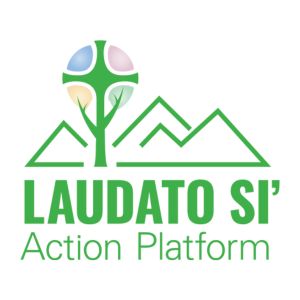A Message from President Aceves
Dear Colleagues,
Regis University is on a journey inspired by Pope Francis and the Jesuit Community to address and respond to environmental and social issues. A committee led by Lindiwei Farrow-Harris of Physical Plant and Kari Kloos, Associate Vice President of Mission, is developing a six-year action plan. The plan will be built around seven goals and invites the university community to engage and promote sustainability initiatives and ecological justice. I asked Lindiwei and Kari to update us on their efforts to date.
“In October 2021, Regis joined the Laudato’ Si Action Platform, which is an initiative by Pope Francis to embark on a “journey toward integral ecology.” By this the Pope means sustainability and environmental care as well as care for those experiencing poverty, community participation, spirituality, education, and economics. These goals come from Pope Francis’s 2015 letter Laudato Si’, which was the first papal encyclical on the environment, addressed to “all people of good will.” In October 2023, Pope Francis issued a follow-up letter called Laudate Deum, in which he reiterated the urgency of the environmental and social crises we face, and he called upon Catholic organizations and people of good will to take action.
Combined with the Society of Jesus’s 2019 “Universal Apostolic Preferences” for all of the universities, schools, parishes, and social ministries around the world sponsored by the Jesuits, Regis is asking, how can we better care for our common home, the Earth?
Since 2022, a committee of people working in a wide range of university units (see below for a list of members) has conducted a baseline assessment and identified current sustainability and justice initiatives around the university. Led by new Interim Director for Sustainability Planning Lindiwei Farrow-Harris, this group is now in the process of developing a six-year plan for the university around seven goals areas:
- Cry of the Earth: A call to protect our common home for the wellbeing of all, as we equitably address the climate crisis, biodiversity loss, and ecological sustainability.
- Cry of the Poor: A call to promote eco-justice, aware that we are called to defend human life from conception to death, and all forms of life on Earth
- Ecological Economics: The economy is a sub-system of human society, which itself is embedded within the biosphere–our common home.
- Sustainable Lifestyles: Sufficiency and promoting sobriety in the use of resources and energy.
- Ecological Education: Re-thinking and re-designing curricular and institutional reform in the spirit of integral ecology in order to foster ecological awareness and transformative action
- Ecological Spirituality: A profound ecological conversion helps us to “discover God in all things”, both in the beauty of creation and in the sighs of the afflicted, aware that the life of the spirit is not dissociated from worldly realities.
- Community Participation and Empowerment: A synodal journey of community engagement and participatory action at various levels.
In our university plan, we hope to coordinate all of our current sustainability and related justice initiatives with discernment of how we can grow. For example, we are finding strengths in curriculum across academic programs that study the United Nations Sustainable Development Goals, better communicating about initiatives across units, and building partnerships for key projects. This fall the First Year Experience in Regis College planted a pollinator garden north of Lot 5 to promote biodiversity on campus, a visible marker of this commitment.
As we move forward, we encourage you to join in! Ask yourself: can you think of ways to engage the Laudato Si goals in your work at Regis? What would you like to see us do as a university and in partnership with Denver organizations? Deans, AVPS, and Directors can talk with faculties and teams about ways to implement Laudato Si’-inspired actions. You can watch the Regist for updates on Laudato Si’ initiatives, marked with the Regis Laudato Si’ logo. And you can reach out to the Office of Mission (mission@regis.edu) to get involved.
As Pope Francis says, “the ecological crisis is also a summons to a profound interior conversion” (Laudato Si’ 217). At the root of all of our actions is our need to better see reality, be moved by it, and respond to it. We invite you over the next six years to join this journey toward an integral ecology at Regis.”
Members of the Regis Laudato Si’ Committee
Co-chair, Lindiwei Farrow-Harris, Interim Director for Sustainability Planning, Physical Plant
Co-chair, Kari Kloos, Office of Mission and Regis College
Maria del Valle Bohorquez, Regis College
Tamara Boynton, ODEIE and University Ministry
Sharon Bramante, University Ministry
Paul Burson, Regis College Service Learning
Martin Doppelt, Regis College First Year Experience
Courtney Duggan, Loretto Heights School of Nursing, RHCHP
Evan Elie, RUSGA representative and Anderson College student
Jenna Farley, Community Relations
Eleanor Hebert, Regis College student
Tyler Imfeld, Regis College Biology
Tom Jenkins, Admissions
Daniel Justin, Office of Mission
M.D. Kinoti, Anderson College Master of Non-Profit Management
Nina Miller, Regis College Master of Development Practice
Melissa Nix, Regis College Service Learning
Eve Passerini, Regis College Sociology and Integrative Studies
Luka Powanga, Anderson College Business
Josef Rill, Auxiliary Services
Janet Rumfelt, Regis College Online Education and Religious Studies
Abigail Schneider, Anderson College SEED Institute
I extend a heartfelt thank you to Kari, Lindiwei, and the members of the Laudato Sí committee. I welcome your integrative planning approach as a way to create comprehensive solutions that will help Regis to act responsibly in caring for our common home.
Kindly,
Salvador D. Aceves, Ed.D
President

